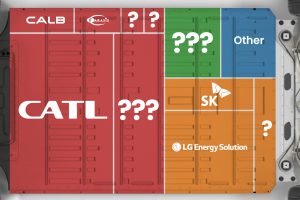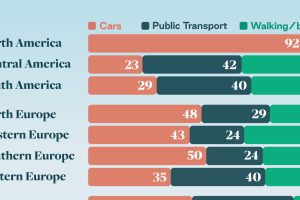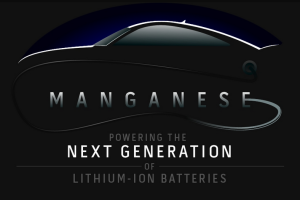Visualizing All Electric Car Models Available in the U.S.
America’s electric vehicle (EV) market has surged over the last decade, and it’s only expected to grow further. The Biden administration has allocated billions towards the EV transition in the hopes that by 2030, electric cars make up 50% of all new cars sales in America.
Given the rising demand, what types of electric car models are available for U.S. consumers to choose from today?
This graphic, using data from Car and Driver and EPA, highlights every single EV that’s available for sale across America, showing the wide range of manufacturers, vehicle types, and prices.
What Electric Vehicles Are Available in America?
As of February 2022, there are 28 different electric vehicles available in the U.S., from 18 different manufacturers. Here are their base model statistics:
| EV Model (2022) |
Price (MSRP) | Max. Horsepower | Combined Fuel Economy | Combined Max. Range |
|---|---|---|---|---|
| GMC Hummer EV Pickup | $110,295 | 1,000 | N/A | N/A |
| Audi e-tron GT | $102,400 | 469 | 82 MPGe | 238 miles |
| Mercedes EQS | $102,310 | 329 | 97 MPGe | 350 miles |
| Tesla Model X | $98,940 | 670 | 102 MPGe | 348 miles |
| Tesla Model S | $94,990 | 670 | 120 MPGe | 405 miles |
| Porsche Taycan | $82,700 | 321 | 79 MPGe | 200 miles |
| Lucid Air Pure | $77,400 | 480 | N/A | 406 miles |
| Rivian R1S | $72,500 | 600+ | N/A | 260+ miles |
| Jaguar I-Pace* | $69,900 | 394 | 76 MPGe | 234 miles |
| Rivian R1T | $67,500 | 600+ | 70 MPGe | 260+ miles |
| Audi e-tron | $65,900 | 402 | 78 MPGe | 222 miles |
| Volvo C40 Recharge | $58,750 | 402 | 87 MPGe | 226 miles |
| Volvo XC40 Recharge | $55,300 | 402 | 85 MPGe | 223 miles |
| Tesla Model Y Long Range | $53,940 | 480 | 122 MPGe | 330 miles |
| Polestar 2 | $45,900 | 231 | 107 MPGe | 270 miles |
| Tesla Model 3 | $44,990 | 283 | 132 MPGe | 272 miles |
| Audi Q4 e-tron | $43,900 | 295 | 95 MPGe | 241 miles |
| Ford Mustang Mach-E RWD | $43,895 | 266 | 103 MPGe | 247 miles |
| Hyundai Ioniq 5 | $43,650 | 168 | 110 MPGe | 220 miles |
| Kia EV6 | $40,900 | 167 | 117 MPGe | 232 miles |
| Volkswagen ID.4* | $40,760 | 201 | 99 MPGe | 260 miles |
| Kia Niro EV | $39,990 | 201 | 112 MPGe | 239 miles |
| Hyundai Kona Electric | $34,000 | 201 | 120 MPGe | 258 miles |
| Chevrolet Bolt EUV | $33,500 | 200 | 115 MPGe | 247 miles |
| Mazda MX-30 | $33,470 | 143 | 92 MPGe | 100 miles |
| Chevrolet Bolt EV | $31,500 | 200 | 120 MPGe | 259 miles |
| Mini Cooper SE | $29,900 | 181 | 110 MPGe | 114 miles |
| Nissan Leaf | $27,400 | 147 | 111 MPGe | 149 miles |
As of February 2022. *Indicates EPA data on fuel economy and range was only available for 2021 models.
At less than $30,000, the Nissan Leaf and Mini Cooper SE are currently the most affordable options for Americans.
Released in 2010, the Nissan Leaf is one of the oldest EVs on the market. Widely considered a pioneer in the EV space, it’s one of the top-selling electric cars in the U.S.—in 2021, more than 14,000 cars were sold in America.
While the Leaf’s low price point may be appealing to many, it has the third shortest maximum range on the list at 149 miles before needing a recharge. The only other cars with shorter ranges were the Mini Cooper SE and the Mazda MX-30.
GMC’s Hummer EV pickup is the most expensive EV on the list, with a base price point of $110,295—however, GMC is planning to release less expensive versions of the Hummer EV over the coming years.
The only other EV pickup available in the U.S. market in early 2022 is Rivian’s R1T. However, more manufacturers like Ford and Chevrolet are planning to release their own EV pickups, and Tesla’s Cybertruck has been in the works for years.
And new EVs are quickly entering the market. For example, BMW’s all-electric i4 and iX have only recently become available for sale in the U.S.
The Top EV Manufacturers
There are a number of domestic and international manufacturers that sell EVs in America, including German manufacturer Audi, Swedish carmaker Volvo, and South Korean manufacturer Kia.
Here’s a breakdown of the 18 different manufacturers on the list, six of which are U.S. based:
| Manufacturer | Country of HQ | # EVs sold in the U.S. |
|---|---|---|
| Tesla | 🇺🇸 U.S. | 4 |
| Audi | 🇩🇪 Germany | 3 |
| Volvo | 🇸🇪 Sweden | 2 |
| Rivian | 🇺🇸 U.S. | 2 |
| Kia | 🇰🇷 South Korea | 2 |
| Hyundai | 🇰🇷 South Korea | 2 |
| Chevrolet | 🇺🇸 U.S. | 2 |
| Volkswagen | 🇩🇪 Germany | 1 |
| Porsche | 🇩🇪 Germany | 1 |
| Polestar | 🇸🇪 Sweden | 1 |
| Nissan | 🇯🇵 Japan | 1 |
| Mini Cooper | 🇩🇪 German | 1 |
| Mercedes | 🇩🇪 German | 1 |
| Mazda | 🇯🇵 Japan | 1 |
| Lucid | 🇺🇸 U.S. | 1 |
| Jaguar | 🇬🇧 UK | 1 |
| GMC | 🇺🇸 U.S. | 1 |
| Ford | 🇺🇸 U.S. | 1 |
Tesla has the highest number of EV models on the market, with four different vehicles available: the Model S, Model X, Model Y, and the Model 3. It’s one of the few manufacturers on the list that exclusively makes electric cars—the only others being Rivian and Lucid.
While anticipation has been building around Tesla’s Cybertruck, and murmurs of a cheaper Tesla have been circulating, Tesla’ CEO Elon Musk has confirmed that there will be no new Tesla models released in 2022. The company will instead focus on its existing models for the time being.
Are U.S. Consumers Ready to Transition to Electric Cars?
It’s important to note that, while EV adoption in America has increased over the years, the U.S. is still lagging behind other countries. Between 2015 and 2020, America’s EV fleet grew at an annual rate of 28%, while China’s grew by 51%, and Europe increased by 41%.
Why are so many Americans dragging their feet when it comes to electric cars? According to a survey by Pew Research Center, the cost is a big barrier, as well as concerns over their reliability compared to gas vehicles.
But with gas prices at all-time highs, and as consumers grow increasingly concerned over the carbon costs of gas vehicles, switching to an electric car may soon be too hard to resist.





